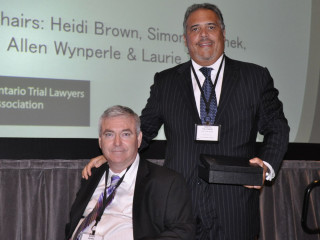This is a motion to withdraw an admission made during oral submissions at a previous summary judgment motion and to amend certain paragraphs of that summary judgment decision.
Date Heard: December 8, 2017 | Full Decision [PDF]
In June 2017, Sutherland J. heard a summary judgment motion brought by The Personal, the Plaintiff’s motor vehicle insurer, for a declaration that the defendant, Pearce, is the owner of the vehicle involved in a collision on September 15, 2007, which was operated by her son, Middleton, and for an order dismissing the action against it. During that motion, Sutherland J. asked all parties whether they agreed that if he found Pearce to be the owner of the vehicle, then Pearce’s motor vehicle insurance with Wawanesa will be available to compensate for any damages found and therefore the action against The Personal can be dismissed. All parties including Pearce agreed. Sutherland J. found in favour of The Personal, declared Pearce to be the owner of the vehicle, and dismissed the action against The Personal (the “Decision”).
In December 2017, Pearce brought this motion for leave to withdraw her admission and to amend parts of the Decision in order to be able to argue that she is not responsible for her son’s actions, which were not negligent but rather an intentional act to injure. Pearce submitted that her response to the Court’s question was not thought through and that it was not her intent to concede that she would be vicariously liable if Middleton is found to be driving not negligently but rather with an intent to injure others. It is noteworthy that Middleton was convicted of two counts of criminal negligence causing bodily harm and four counts of aggravated assault. The Personal noted that Pearce’s intent had not been an issue in this litigation prior to the Decision.
Sutherland J. concluded that as Middleton was convicted of criminal negligence causing bodily harm, the elements of negligence were proven at a higher standard in the criminal proceeding and therefore, the finding of negligence in the criminal proceeding is binding in this civil proceeding. Pearce argued that Middleton was also convicted of aggravated assault, which proves an intent to injure. Sutherland J. disagreed, stating that it proves an intentional act occurred, but not necessarily an intent to injure. He further concluded that an additional conviction of aggravated assault does not negate the factual finding of negligence in the conviction of criminal negligence causing bodily harm. Sutherland J. found the admission to be immaterial and would dismiss Pearce’s motion on this basis.
Sutherland J. also reviewed and applied the test for leave to withdraw an admission. He found that the admission was a question of mixed fact and law and that its withdrawal did not result in prejudice that could not be compensated for in costs. However, he noted that Pearce’s pleadings did not plead that Middleton was driving with an intent to injure. At the examination for discovery, Pearce’s counsel indicated that her defence was that she was not the actual owner of the vehicle at the time of the collision. Therefore, the proceeding’s triable issues do not include whether Middleton operated the vehicle with an intent to injure. Additionally, Sutherland J. found that, given the chronology and history of the proceedings and Pearce’s defence, no reasonable explanation for the admission’s withdrawal was provided. There were no new facts and all facts regarding Middleton’s operation of the vehicle were known to Pearce before the summary judgment motion hearing. Sutherland J. opined that Pearce wished to take a new strategic defence position because the Court did not accept the first strategy relating to ownership. Sutherland J. was not persuaded that the circumstances met the test for leave to withdraw an admission and dismissed the motion.
Read the full decision [PDF]













1 Comment